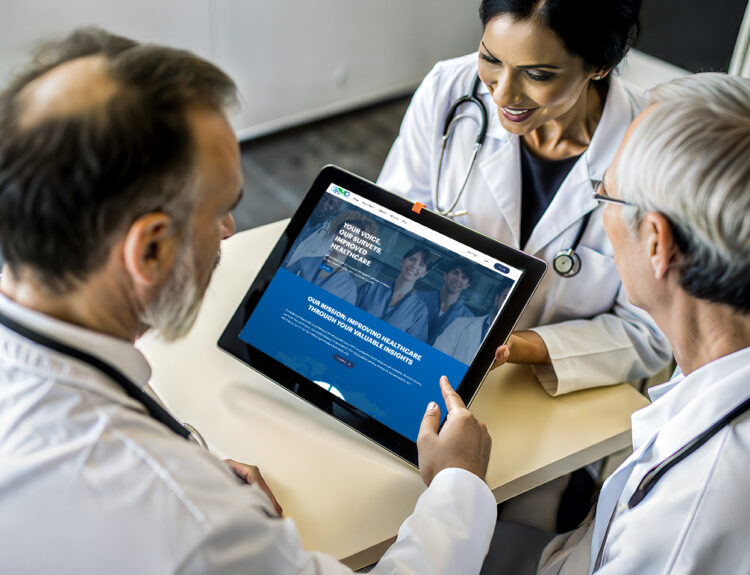Predictive modeling analyzes historical data with real-time data to anticipate future outcomes, which allows healthcare professionals to make more informed decisions for better patient outcomes. This stat alone is enough to conclude how data plays a major role in the development of modern healthcare. It serves as a crucial element behind developing advanced treatment solutions and optimizing patient care.
However, data alone cannot prove to be worthy unless experts channelize it! That’s the exact reason why market researchers rely heavily on doctors feedback to enhance drug formulations and improve public health strategies. These researchers and KOLs gather expert insights via market surveys and help bridge the gap between R&D and practical application.
Let’s take a tour of this blog and explore in detail about the reasons behind researchers’ dependency on physicians’ insights for the betterment of healthcare.
Why is Doctors Feedback Crucial for Medical Research
Healthcare professionals play a quintessential role in the field of medicine. These experts stand at the forefront of patient care, and their direct interactions help them have unique perspectives on treatment efficacy and challenges.
Let’s take a real-world instance to understand this thoroughly. A recent journal published in The Lancet has shown how critical real-world evidence is to assess the risks and benefits of medical interventions among patients. Such kind of evidence is extracted from the valuable insights of doctors that are gathered via medical research surveys. That’s why the practical insights and feedback of a healthcare professional are vital to understand treatment and drug efficacy, and how patients respond to them.
Therefore, a physician’s practical feedback helps in-
- Identification of unreported side effects
Being the frontline professionals, doctors work closely with patients. This helps them monitor their patients, through which they can detect the rare adverse reactions that might not have emerged during clinical trials.
- Suggesting modifications in treatment based on patient demographics
Since frontline professionals have experience with diverse patient demographics, their suggestions help bring modifications in treatment to optimize outcomes.
- Enhancement of clinical guidelines
The practical insights and experience of healthcare professionals help KOLs and industry leaders refine treatment policies and guidelines. This results in the establishment of more practical healthcare policies that lead to better patient outcomes.
Key Areas Where Doctor Feedback Drives Medical Progress
Now that you know how crucial a professional’s feedback is, let’s take a look at the pivotal areas where their insights can drive progress-
- Drug development and clinical trials

Before any new drug or medication releases in the market, pharma brands make sure to seek doctors feedback. Why? To understand effective dosage amounts, patient compliance, and the potential challenges of the drug in a practical scenario.
For instance, studies published in the PMC clearly state that real-world feedback on drug efficacy and administration can bring about crucial modifications in drug formulation. It also states that these insights, gathered through medical research surveys, help pharma brands make informed decisions throughout the entire product development cycle.
- Medical devices and technology
The advancement of medical devices and technologies also depends heavily on a doctor’s input. Take for instance, wearable devices like continuous glucose monitors (CGMs). Its efficacy, accuracy, and ease of use in practical scenarios improved significantly, all thanks to the critical insights of endocrinologists!
In fact, a MedPAC research suggests that physicians have historically been accounted for about 20% of patents issued for medical devices.
- Healthcare policies and public health
A doctor’s insights don’t just help in new drug formulations or enhancing treatment development procedures. Rather, it also remains instrumental in helping government agencies and/or public health organizations shape healthcare policies. Recommendations related to disease management protocols or vaccinations are highly dependent on the insights of a doctor.
The Centers for Disease Control and Prevention (CDC) recommends that anyone over 6 months old should get vaccinated every flu season. This was done on the basis of the concerns related to vaccines, which were reported by family physicians.
- Patient care and treatment guidelines
The feedback of a doctor is also important to refine overall treatment protocols for an array of conditions. This includes chronic diseases, pain management, mental health, and many more! Their firsthand clinical experience and close interaction with patients help develop treatment procedures that aren’t just relevant, but feasible in everyday practice.
The Process: How Physician Surveys Work

So, this is what the procedure looks like:
- A doctor receives a medical market research survey.
- He/she completes the survey.
- The insights are collected by medical market research companies.
- Pharma brands, KOLs, med-tech manufacturers, etc., use these insights to develop treatment procedures and drugs.
But how does the process of preparing a medical survey work? Here’s a 4-step guide to help you through:
- Step 1: Researchers identify knowledge gaps
That’s the very first step from where the whole process initiates! This step involves the identification of the areas that still require understanding of disease progression or treatment efficacy.
- Step 2: They design targeted surveys for doctors in relevant specialties
After the initial process is done, it’s time for researchers to craft surveys. This is probably the most challenging part of this entire procedure. That’s because researchers have to address each and every identified knowledge gap and create questionnaires based on specific treatment challenges.
- Step 3: Physicians provide responses based on real patient interactions
Up next, these surveys are distributed to healthcare professionals via survey platforms. Upon receiving, the professionals answer the queries from their experiences and observations that they gain from their daily practice.
- Step 4: Data is analyzed, and research findings shape medical decisions
Finally, market researchers thoroughly analyze the collected data. They look for any trends, patterns, and statistically significant findings that can help KOLs, med-tech companies, or pharma brands to develop treatment protocols.
Not just that, but it also helps these institutions come up with new drugs and enhanced healthcare policies for the betterment of the patients.
Why Do Researchers Trust Medical Survey Panels
Market researchers dealing with healthcare research surveys heavily depend on the insights of healthcare professionals to understand the knowledge gaps and existing treatment challenges.
However, that’s just the tip of the iceberg! Here are some more reasons as to why researchers trust healthcare panels:
1. Access to a large, diverse group of healthcare professionals
Every medical survey panel, including us at MDForLives, offers researchers access to a vast network of doctors of various specialties worldwide. This eventually helps them gather diverse perspectives, which ensures their research findings have broader applicability.
Statistics suggest that about 60% of clinical studies done by market researchers integrate physician panels to enhance the global relevance of their analyses.
2. Real-world clinical experience
Another reason why researchers rely heavily on medical survey panels is due to their practical experience. Controlled trials might offer important data, but they miss out on the complexities and nuances of real-world challenges in patient care.
For instance, surveys taken by Oncologists have helped identify variations in targeted cancer therapies across diverse patient groups.
- Regulatory compliance and ethical research
Renowned survey panels, including us at MDForLives, abide by stringent regulatory guidelines like GDPR and CCPA. This assures privacy and confidentiality of the participants and protection of their personal information.
That’s another reason behind researchers trusting the calls of survey panels.
3. Faster, more cost-effective data collection
As compared to traditional studies that took years to complete, medical surveys are substantially faster and far cost-effective ways to gather valuable insights! This enables researchers to be more prompt in their responses to emerging healthcare trends and needs.
Challenges in Medical Research Without Physician Feedback
The very thought of medical research without physician feedback is enough to send shivers down the spine. It’s much like expecting food to be delicious without adding salt to it!
Coming to the point, there emerges an array of challenges if the main ingredient of medical research – a doctor’s feedback- is absent. Let’s take a closer look:
- Risk of biased clinical trials
Without the valuable input of a frontline professional, clinical trials might not effectively portray practical scenarios. This might lead to biased results that fail to cater to the complexities faced by patients.
- Delayed recognition of side effects
As suggested by research published in PMC, lack of practical insights from doctors might even lead to delays in the identification of rare side effects among some patients. This means patients experiencing such side effects might have to suffer for a prolonged period.
MDForLives Facilitates Meaningful Doctor-Researcher Collaboration

We at MDForLives happen to be one of the most renowned healthcare market research organizations, with over 1.2 million panelists across the world. We help researchers with access to exclusive medical panels and make sure that their enquiries are met with real-world insights from the experts.
Not just that, but we also understand the importance of survey relevance very well. That’s why we try to craft surveys that are tailored to the specific specialties of our physician panel. This helps increase the value and applicability of the collected data.
Most importantly, we follow a transparent reward system, which rightfully acknowledges the time and efforts of participating physicians. So, what are you waiting for? Complete your registration, and join our massive global community to take part in paid medical surveys and make your opinions count!
FAQs
-
Why is physician feedback important in medical research?
Doctors provide real-world insights on treatment procedures and patient care. Their practical experience helps them identify the nuances and issues in existing practices. Hence, their feedback helps researchers understand current gaps, which translates to the development of innovative healthcare strategies.
-
How do doctors contribute to medical research through surveys?
Doctors share their clinical experience and feedback in medical surveys. Not just that, but they also report on treatment efficacy and potential side effects. These help in developing new therapies for better patient care.
-
What kind of surveys do physicians typically take?
Oftentimes, physicians take up surveys about specific medical cases. This approach helps them learn about different treatment patterns and patient outcomes. Sometimes, they also take up surveys on new drugs or medical devices.
-
Are physician surveys confidential and secure?
Yes, medical surveys contain sensitive information, and hence, they are highly confidential and secure. Renowned platforms like us at MDForLives ensure complete protection of their findings through data encryption methods.
-
How can I start participating in medical surveys?
Here’s the easiest guide for you to start participating in medical surveys-
- Look for a reputable medical survey platform, like MDForLives.
- Complete the registration process and your professional profile.
- And you’re done!

MDForLives is a global healthcare intelligence platform where real-world perspectives are transformed into validated insights. We bring together diverse healthcare experiences to discover, share, and shape the future of healthcare through data-backed understanding.






